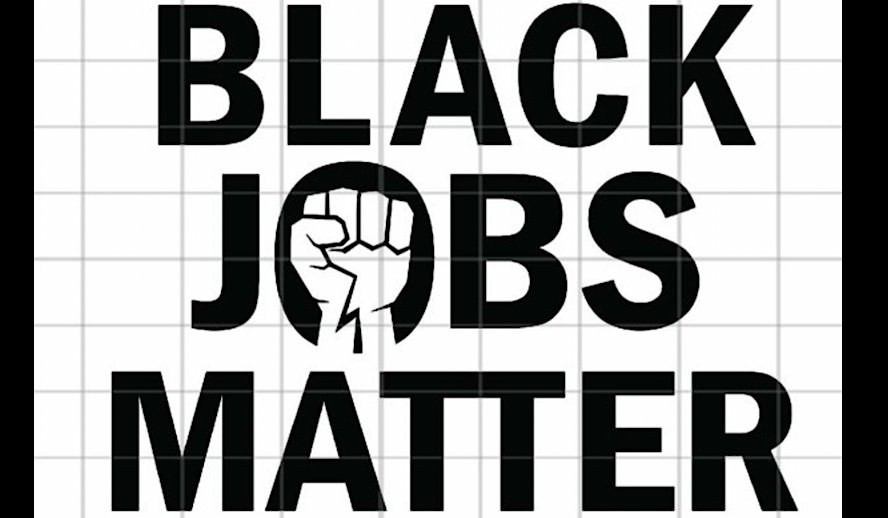Table of Contents

Photo: Black Jobs Matter
History does repeat itself, albeit in varying iterations. For those who believe that slavery’s gripping effects on American society have fizzled out, now is as best a time as any to reconsider America’s original sins. We’re in the midst of an era of growing civil unrest, including a movement of resisting police brutality and attempting to dismantle a corrupt justice system; indeed, there is no time like the present to be reminded of the damning effects of racism.
America has a nasty habit of forgetting its past. While this is partially due to our cultural amnesia about unsightly events, the recurrence and repeating patterns of the various manifestations of racism are far more intentional than we’d perhaps like to admit.
Related article: HBCU, A Black American Secret Tradition | Historically Black Colleges and Universities
Related article: How Old Black Actors Ages 60+ Got their Start and What They’re Doing Now!
In a study on Black opportunity, The Brookings Institution (previously known as the Institute for Government Research) found that the damning effects of Jim Crow have never left our country’s DNA. They state that poor public education, employment discrimination, and a faulty criminal justice system are all factors that continue to linger several decades after the passing of The Civil Rights Act. This is merely the tip of the iceberg. To further understand the nature of the present, we must fully understand the harsh realities of our past.
Black Jobs Matter – The Shadows of Slavery
While the discussion of Black oppression quite literally begins with the cannonball of slavery (1619-1865), by looking at white supremacy’s ripple effects, we can see precisely how we’ve ended up with its present iteration.
Black Codes were regional laws limiting the opportunity of Black people and ensuring cheap labor after the abolishment of slavery at the dawn of the civil war. “After Reconstruction…states such as South Carolina enacted strict “Black Codes” that fined Black people if they worked in any occupation other than farming or domestic servitude” (American Progress). Black Codes held a vice grip on the type of opportunity Black people could have after slavery had theoretically ended.
Subscribe to Hollywood Insider’s YouTube Channel, by clicking here.
Sharecropping was a common form of exploitive labor Black people were forced into. (This was the practice of a landowner allowing a tenant to work the land with the understanding that compensation would come in the form of a portion of the crops given to the landowner at the end of the year.) The first major issue here is that during this time especially, land ownership was one of the main ways one could upward attain social mobility. The second major issue is that even under this seemingly livable (although economically stagnant) contract, many Black people would end up going into debt for the use of tools and other supplies they’d have to pay back (History).
While Sharecropping and Black Codes have fizzled out on paper for Black Americans, their core principles have merely changed form. When people are desperate for upward social mobility, they often turn to the likes of student loans and accrue unmanageable credit card debt and mortgages. America’s classist practices have always persisted, and they are especially dangerous for Black Americans who are generationally stunted in terms of education, including financial literacy.
Black Education, Now and Then
Black Codes eventually morphed into Jim Crow laws, the infamous segregationist policies that denied Black people’s right to vote, work or attend certain schools. The divide in opportunity for Black people can be directly tied to Jim Crow laws and the damning shadow that segregation casts.
Related article: The Power of Positivity: Ikorodu Bois + Chris Hemsworth + Russo Brothers + Sam Hargrave
Limited Time Offer – FREE Subscription to Hollywood Insider
An NPR article titled “Why White School Districts Have so Much Money” asserts that most school districts are funded by regional taxes. Non-white school districts are so poor because “school district borders are drawn along municipality lines that reflect years of residential segregation”.
The Jim Crow practice of Redlining or the discriminatory act of limiting where BIPOC could buy and rent housing to keep neighborhoods segregated is a curse that continues to foster new consequences long after the 1964 Civil Rights act was passed, making Jim Crow laws illegal.
The crippling of Black school systems due to the effects of American segregation has resulted in Black youth that often struggle to enter the workforce. The U.S Bureau of Labor Statistics reports that 62.9% of all Black Americans 25 years or older have less than a Bachelor’s degree, with 11.1% of those individuals having less than a high school diploma. They argue that “greater education attainment is generally associated with a higher likelihood of labor force participation” and that “77.4 percent of Blacks with a bachelor’s degree participated in the labor force ” in 2019. While a college degree certainly is not everything and not the only path towards success, statistically speaking, for Black Americans, it is often essential.
Related article: Hollywood Insider’s CEO Pritan Ambroase: “The Importance of Venice Film Festival as the Protector of Cinema”
Related article: The Masters of Cinema Archives: Hollywood Insider Pays Tribute to ‘La Vie En Rose’, Exclusive Interview with Director Olivier Dahan
Occupational segregation is the reality that Black workers typically make less than white works (Center for American Progress). The same study shows that across a variety of categories, including gender, age, veteran status, and degree status, Black workers have a significantly higher unemployment rate than their white counterparts. Even Black workers with college degrees do not get the same consideration interviews as whites: “While college attainment helps all workers get more access to better-paying, stable jobs…the advantages are not evenly distributed. Black workers, no matter their level of education, still face impediments in the labor market”. It’s harder for a Black person to get a job than it is for our white counterparts, and the core of this issue is racism. The effects of America’s discrimination have never gone away, they’ve merely changed form.
The Real Threat
“History is not the past. It is the present. We carry our history with us. We are our history. If we pretend otherwise, we are literally criminals.” – James Baldwin, I Am Not Your Negro
Our popular media, art, and culture have become very efficient at misunderstanding the nature of racism. The worst of it does not operate in singular acts or in the waving of flags or even the utterance of words– all of those are the surface level effects of institutional racism.
The real threat to our country is the racism that we can not see, the invisible white ghosts are far more dangerous than the ones cloaked in hooded sheets. It’s time for us to tackle the invisible racism if we wish to see the real changes in Black equity and opportunity.
By Tyler Bey
Click here to read Hollywood Insider’s CEO Pritan Ambroase’s love letter to Black Lives Matter, in which he tackles more than just police reform, press freedom and more – click here.
An excerpt from the love letter: Hollywood Insider’s CEO/editor-in-chief Pritan Ambroase affirms, “Hollywood Insider fully supports the much-needed Black Lives Matter movement. We are actively, physically and digitally a part of this global movement. We will continue reporting on this major issue of police brutality and legal murders of Black people to hold the system accountable. We will continue reporting on this major issue with kindness and respect to all Black people, as each and every one of them are seen and heard. Just a reminder, that the Black Lives Matter movement is about more than just police brutality and extends into banking, housing, education, medical, infrastructure, etc. We have the space and time for all your stories. We believe in peaceful/non-violent protests and I would like to request the rest of media to focus on 95% of the protests that are peaceful and working effectively with positive changes happening daily. Media has a responsibility to better the world and Hollywood Insider will continue to do so.”
More Interesting Stories From Hollywood Insider
– Do you know the hidden messages in ‘Call Me By Your Name’? Find out behind the scenes facts in the full commentary and In-depth analysis of the cinematic masterpiece
– A Tribute To The Academy Awards: All Best Actor/Actress Speeches From The Beginning Of Oscars 1929-2019 | From Rami Malek, Leonardo DiCaprio To Marlon Brando & Beyond | From Olivia Colman, Meryl Streep To Bette Davis & Beyond
– Why Queen Elizabeth II Is One Of The Greatest Monarchs | Her Majesty Queen Elizabeth II of United Queendom of Great Britain & Northern Ireland
– Compilation: All James Bond 007 Opening Sequences From 1962 Sean Connery to Daniel Craig
– In the 32nd Year Of His Career, Keanu Reeves’ Face Continues To Reign After Launching Movies Earning Over $4.3 Billion In Total – “John Wick”, “Toy Story 4”, “Matrix”, And Many More
– Want GUARANTEED SUCCESS? Remove these ten words from your vocabulary| Transform your life INSTANTLY
black jobs matter, black jobs matter, black jobs matter, black jobs matter, black jobs matter, black jobs matter, black jobs matter, black jobs matter, black jobs matter, black jobs matter, black jobs matter, black jobs matter, black jobs matter, black jobs matter, black jobs matter, black jobs matter, black jobs matter, black jobs matter, black jobs matter, black jobs matter, black jobs matter

Tyler Isaiah Bey is a writer and actor from Atlanta, Georgia. His emphasis on storytelling through his work guides him through his writing. His theatre background has given him a love for honest performance and a strong appreciation for art. Hollywood Insider’s focus on education, philanthropy, and anti-drama is the perfect platform for Tyler who’s unique and often intersectional perspective gives him a honed edge to the work he creates. He finds joy in discovering powerful crossroads of current events and media and infuses this cultural awareness into his writing. For it’s these intersections that make art so powerful and writing such a pleasure for Tyler.








